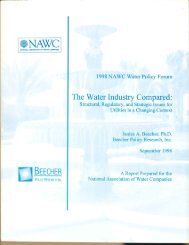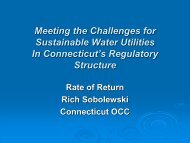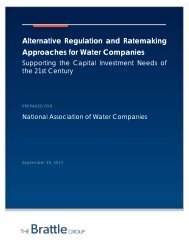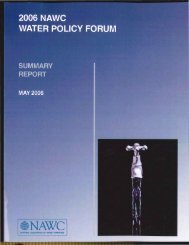CENTER FOR URBAN POLICY AND THE ENVIRONMENT - NAWC
CENTER FOR URBAN POLICY AND THE ENVIRONMENT - NAWC
CENTER FOR URBAN POLICY AND THE ENVIRONMENT - NAWC
Create successful ePaper yourself
Turn your PDF publications into a flip-book with our unique Google optimized e-Paper software.
Indiana University + School of Public & Environmental AffairsCenter for Urban Policy & the EnvironmentTable 3A Theory of Providers and PerformanceType of Guiding Focus of · Motivation Mechanism of Mechanism Mechanism forProvider Performance Effort Accountability for Consumer ControllingPrinciple Protection BehaviorPublicly Service Controlling Political Voters Public Elections andowned prices support ownership other politicalprocessesRegulated Prudence Meeting Compliance Ratepayers Regulatory Rules andstandards proceedings regulations'Competitive Eft1ciency Cost control Profits Customers Consumer Markets andchoice competitionSource: Author's construct.Competition in the water industry is perhaps most apparent in the area of contracts. Insome cases, utilities compete for acquisitions of smaller utilities or for extending service into newareas. Although competition for ownership in the water industry may be limited, some watermarkets appear to be contestable in this regard. A leading example is when a municipalityconsiders using powers of eminent domain to "condemn" and take over a water utility. Followingthe acquisition, the same municipality also might entertain competitive bids from alternativeproviders of operation and maintenance services. Among other things, this form of ownershiptransfer often will remove the utility from pubic utility commission jurisdiction.The contestable form competition between publicly and privately owned water utilities isgreatly distorted by the advantages of public sector in terms of tax exemptions, access to capital(including governmental loans and grants), absence of state economic regulation (for the mostpart), and the ability to subsidize the cost of providing water service. These factors combine togive municipalities a competitive advantage, especially in terms of water pricing. In theory, acontestable market provides utilities with performance incentives. Whether or not contestabilitycan provide the same level of discipline as competition or regulation (and substitute for theseinstitutional mechanisms) is not well known. 1313In Kansas, an investor-owned utility is not commission regulated if it serves only within the boundaries of onemunicipality. A "contestability" interpretation of this provision suggests that municipal control and perhaps thethreat of takeover is sufficient for economic regulatory purposes.16
















